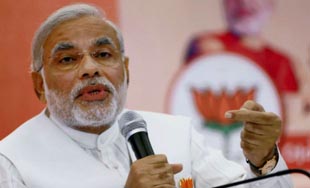 Aligarh, Apr 6: Narendra Modi on Sunday attacked Sonia Gandhi and Samajwadi Party chief Mulayam Singh Yadav accusing them of indulging in vote bank politics and “misleading” Muslims in the name of secularism.
Aligarh, Apr 6: Narendra Modi on Sunday attacked Sonia Gandhi and Samajwadi Party chief Mulayam Singh Yadav accusing them of indulging in vote bank politics and “misleading” Muslims in the name of secularism.
He also sought to blame Ms. Gandhi and Mr. Yadav for the communal clashes, saying “700 riots took place right under the nose of Madam Soniaji in the last one year and 250 of them took place right here under Netaji (Yadav) in Uttar Pradesh.”
“In a recent speech, Madam Soniaji talked about the 15-point programme for developing 90 Muslim-dominated districts in the country of which 15 are in UP. But when an MP asked about the work under the project, Ms. Soniaji’s UPA government said not a single paise has been spent in last one year. This is an example of misleading the Muslims and people,” he said in a rally in Aligarh.
The BJP prime ministerial candidate charged that the Congress, SP and the BSP do “vote bank politics and sing songs of secularism. What they do is just talking. They only talk of secularism but their politics is all about keeping all classes poor through their politics.”
He said the Congress and the SP “only talk about secularism. They can neither provide development nor security to the people and they have no right to be in power even for a second.”
The BJP leader sought to suggest that the state of Muslims under his rule in Gujarat was better than compared to other non-BJP states, saying central government figures “show that among the urban Muslims, there are 50 per cent poor in U.P. whereas the figure is 60 per cent in Bihar. In Gujarat, the figure is only 14 per cent.”
Mr. Modi accused the Congress of being against bringing black money stashed in foreign banks saying, “If we come to power, we will bring back every single paise of black money and use it for the development and welfare of poor.”





Comments
Add new comment